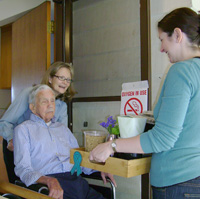By Janis Siegel, JTNews Correspondent
She’s a 34-year-old, fifth-generation civil engineer turned professional chef who nursed her mother through a three-year battle with ovarian cancer. She spent much of that time cooking some of the finest chopped liver and latkes around.
Rachel Speer learned from the best, she will tell you — from her best friend, that is, her mentor and mother, Deborah Wallk-Speer, who she surrounded with love and luscious nostalgic Jewish kitchen smells while caring for her in her Issaquah home during her treatment at Seattle Cancer Care Alliance.
Wallk-Speer succumbed to her disease in March 2008 at the age of 61, but her daughter left her old career behind and started a new Eastside business, Comfort Food Meal Delivery, found at www.comfortfooddelivery.com, to keep her passion for home cooking alive and help others at the same time.
“I feel so good while I’m cooking for someone,” said Speer, “and I know that what I’m making is going to make them feel better and comfort them. My mother was a caterer and I catered quite a bit with her. Now, I can’t imagine doing anything else.”
“Deb” as she liked to be called, had to sell her lifelong home in Des Moines, Iowa, and move in with Speer and her husband to fight her illness.
Doctors in Arizona, where Wallk-Speer owned a second home, and where she was first diagnosed in August of 2005, told her to get her affairs in order and prepare for the end of her life. It wasn’t until she sought treatment at the SCCA that she was given hope and a very different prognosis.
“My mom had everything bad,” said Speer. “She had BRCA1 and BRCA2 mutations.”
An average of the five to 10 percent of women who are diagnosed each year with breast cancer have the inherited breast cancer one and two mutation, or BRCA1 and BRCA2. They are at higher risk than most people for developing breast cancer as well as ovarian cancer, according to the National Cancer Institute.
Those with an increased risk also include both men and women who have a family history of cancer and those with Ashkenazi, or Eastern European Jewish ancestry.
Women who have both genetic mutations have a 23 percent greater chance of developing ovarian cancer by age 30, according to the NCI, and the likelihood increases to 63 percent by age 70.
Speer’s mother had no incidence of breast cancer, however, even though she had both genetic mutations associated with it. But she did have high blood levels of CA-125, a protein found in ovarian cancer cells and a blood marker that indicates the presence of a developing ovarian cancer.
“Normal for CA-125 is between one and 21,” said Speer, who admits she has inadvertently become somewhat of an expert in these matters. “Mine is seven. Mom’s was 6,000 when she was first diagnosed. The SCCA got it back down to three. I really can’t sing their praises high enough.”
Reducing the CA-125 levels in Wallk-Speer’s blood won her two-and-a-half additional years with her daughter and son-in-law.
“Deb was very loving, upbeat, spunky and never complained about her cancer,” said Daniel Smith, Speer’s husband. “We had a peaceful coexistence and shared a lot of laughter. I enjoyed the time she spent with us. I was closer to her than my own mother.”
Ever since her mother was diagnosed, Speer herself has been routinely having mammograms as well as the CA-125 blood marker test.
“This is something I have every six months,” said Speer. “Every Ashkenazi woman should get a CA-125 test. We need to be tested more often. It’s hitting our community especially hard.”
The CA-125 test is also an in-office procedure, requiring a simple blood draw from patients. However, several women’s reproductive disorders like endometriosis, benign ovarian cysts, pregnancy in the first trimester, and pelvic inflammatory disease can all cause a false positive result.
“They’re going to check to see if I have that and then they’ll go from there,” said Speer, who admits it makes her a little scared. “I get the results and if they’re positive, we talk about what I should do. If they’re negative, we still talk about how I prevent getting ovarian and breast cancer.”
Meanwhile, she cooks.
Although she officially opened her “cyber-doors” in August of this year, the fledgling entrepreneur is busy personally delivering her home-cooked soups and stews, desserts, side dishes, and Jewish delicacies to anyone on the Eastside.
“It’s not just for people with cancer, said Speer. “It’s also for people who’ve had surgery, or new moms, or people who are on bed rest, or busy professionals. I’m very well-versed on how to prepare food in a specific environment, and I take care not to bring in any outside germs.”
For an extra $6.95, she’ll cross the lake and bring meals to Seattle locations. Eventually, as the business grows, she hopes to drop that fee.
As the High Holidays approach, Speer recalls how important it was for her mother to eat the traditional Jewish foods that make the season so special. It was “non-negotiable,” said Speer, and she would make her mother entire Rosh Hashanah meals.
“She wanted to partake of the smells,” recalled Speer. “I would set her up on the couch where she could hear the oil frying, and the smell of the chopped liver would fulfill her.”
